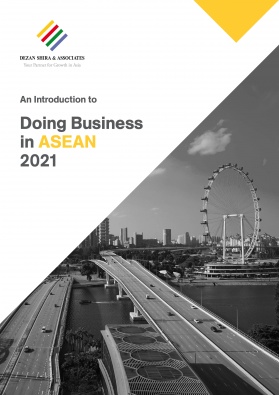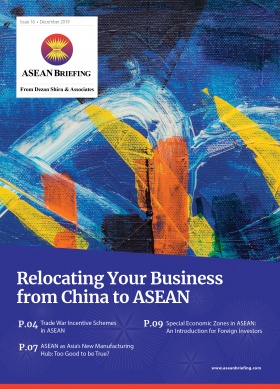How Malaysia’s PERMAI Stimulus Package Benefits Businesses
- In early January 2021, Malaysia launched the PERMAI stimulus package to support businesses.
- Valued at 15 billion ringgit (US$3.6 billion), the incentives under PERMAI pertain to the enhancement of incentives issued throughout 2020, such as the wage subsidy program.
- The issuance of PERMAI comes as the country enters into another lockdown, set to last until February 18, 2021.
On January 18, 2021, Malaysia’s government launched the Malaysian Economic and Rakyat’s Protection Assistance Package (PERMAI), a stimulus package valued at 15 billion ringgit (US$3.6 billion) aimed at providing vital support to businesses through various incentives in addition to strengthening the country’s welfare programs.
The issuance of PERMAI comes after the government reimposed the movement control order (MCO) on Jan 13 to curb the rising number of COVID-19 cases. The MCO will be in effect until February 18, 2021.
Malaysia has issued a number of stimulus packages throughout 2020 as the country battled the economic impact caused by the pandemic. The stimulus package issued prior to PERMAI was PENJANA, issued June 9, 2020, and was valued at US$8.1 billion. The largest stimulus package was issued in March 2020, valued at US$57 billion or 17 percent of Malaysia’s GDP.
PENJANA provided new tax incentives to attract foreign companies to relocate their operations to Malaysia. This included a zero percent tax rate for 10 years for companies in the manufacturing sector with investments in fixed assets between 300 million ringgit (US$70 million) and 500 million ringgit (US$116 million).
In addition, businesses in the export of commodities (palm oil, crude palm kernel oil, and refined bleached deodorized palm kernel oil) were eligible for 100 percent export duty exemption until December 3, 2020.
Support for businesses
Under this objective, PERMAI provides a variety of initiatives and incentives to help businesses in the country. These are the following:
Enhancement of wage subsidy program
The government will enhance the wage subsidy program whereby employers currently operating in states under the MCO will be eligible to apply for a one-month subsidy of 600 ringgit (US$147) for each employee earning less than 4,000 ringgit (US$980) per month, of up to 500 employees. Previously, the wage subsidy scheme was limited to 200 employees per company.
Special grant for SMEs
The government has prepared a special grant for some 500,000 SMEs currently under MCO with payment of 1,000 ringgit (US$245) each. Further, SMEs that are not under MCO (approximately 300,000 businesses) will receive 500 ringgit (US$122) each. This program was previously available to traders and hawkers in the state of Sabah.
Expediting the implementation of micro-credit scheme
To assist micro-enterprises, the government will expedite the implementation of a micro-credit scheme valued at 1 billion ringgit (US$245 million). This scheme was initially issued under previous stimulus packages although the budget allocated for the program was half, at 500 million ringgit (US$122 million).
Extending measures for contractual obligations
In 2020, the Temporary Measures for Reducing the Impact of COVID-19 Act 2020, or Act 829, was enacted to provide businesses an extended timeline to perform their contractual obligations, until December 31, 2020. Under PERMAI, this has now been extended to March 31, 2020.
Enhancing the Danajamin guarantee scheme
In mid-2020, the government introduced Danajamin Guarantee Scheme (SPGS), a 50 billion ringgit (US$12.2 billion) financial guarantee scheme to help large companies obtain working capital with an emphasis on long-term financing.
Under this scheme, there is a guarantee coverage of 400 million ringgit (US$98 million) or 80 percent of the minimum guaranteed loan size of 20 million ringgit (US$4.9 million). The tenure of DPGS is up to five years.
The government will increase the maximum financing for this scheme from 500 million ringgit (US$122 million) to 1 billion ringgit (US$245 million). Moreover, the amended scheme will expand the scope of financing to cover working capital, with a guarantee period of up to 10 years, and allowing foreign-owned companies operating in Malaysia to be able to access this scheme. Foreign companies are only eligible if 75 percent of their workforce is Malaysian employees.
Supporting online businesses
To continue support for businesses in generating income through e-commerce platforms, the government has allocated 300 million ringgit (US$73 million) to provide micro-entrepreneurs with training with the digitalization of their business as well as on-boarding to e-commerce platforms.
Rescheduling the moratorium for MARA repayments
Businesses that took loans from TEKUN Nasional, Majlis Amanah Rakyat (MARA) as well as other cooperatives and Government agencies providing financing facilities, will be given a moratorium until March 31, 2020.
In addition, MARA has provided a 30 percent discount on rent for business premises for six months starting November 2020 until April 2021.
Extension of sales tax exemption on passenger vehicles
Under the PENJANA package, locally assembled passenger vehicles were eligible for 100 percent sales tax exemption and 50 percent sales tax exemption for imported passenger vehicles, effective from June 15, 2020, to December 31, 2020.
PERMAI has extended the above exemption until June 30, 2021.
Extension of personal income tax relief on the purchase of cell phones, computers, and tablets
PENJANA also provided individual income tax relief of up to 2,500 ringgit (US$616) for the purchase of cell phones, computers, and tablets made from June 1, 2020, to December 31, 2020.
This has been extended under PERMAI until December 31, 2021.
Special tax deductions for landlords
Landlords that can offer a reduction in rent rates on the business premises to SMEs will receive a 30 percent tax deduction from the original rental rate from April 1, 2020, to June 30, 2021. This special deduction will also be expanded to non-SMEs.
Continued discounts for electricity
From January to March 2021, businesses in the six following sectors will receive a 10 percent discount on electricity bills. These sectors are:
- Hotel operators;
- Theme parks;
- Convention centers;
- Shopping malls;
- Local airline offices; and
- Travel and tour agencies.
Bus and taxi hire purchase rehabilitation scheme
The government will introduce a bus and taxi hire purchase rehabilitation scheme, which will provide a 50 percent guarantee on financing for hire and leasing companies for selected bus and taxi operators.
About Us
ASEAN Briefing is produced by Dezan Shira & Associates. The firm assists foreign investors throughout Asia and maintains offices throughout ASEAN, including in Singapore, Hanoi, Ho Chi Minh City, and Da Nang in Vietnam in addition to Batam and Jakarta, in Indonesia. We also have partner firms in Malaysia, Bangladesh, the Philippines, and Thailand as well as our practices in China and India. Please contact us at asia@dezshira.com or visit our website at www.dezshira.com.







